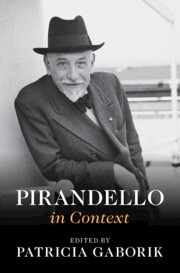Book contents
- Pirandello in Context
- Pirandello in Context
- Copyright page
- Dedication
- Contents
- Figures
- Contributors
- Preface
- Acknowledgments
- Chronology
- List of Cited Titles in Translation and the Original Italian
- Part I Places
- Part II Institutions
- Part III Interlocutors
- Part IV Traditions and Trends, Techniques and Forms
- Part V Culture and Society
- Part VI Reception and Legacy
- Chapter 34 Critical Foundations
- Chapter 35 Avant-Garde Theatre after Pirandello
- Chapter 36 Cinema after Pirandello
- Further Reading
- Index
Chapter 35 - Avant-Garde Theatre after Pirandello
from Part VI - Reception and Legacy
Published online by Cambridge University Press: 14 March 2024
- Pirandello in Context
- Pirandello in Context
- Copyright page
- Dedication
- Contents
- Figures
- Contributors
- Preface
- Acknowledgments
- Chronology
- List of Cited Titles in Translation and the Original Italian
- Part I Places
- Part II Institutions
- Part III Interlocutors
- Part IV Traditions and Trends, Techniques and Forms
- Part V Culture and Society
- Part VI Reception and Legacy
- Chapter 34 Critical Foundations
- Chapter 35 Avant-Garde Theatre after Pirandello
- Chapter 36 Cinema after Pirandello
- Further Reading
- Index
Summary
The work of avant-garde auteurs from the mid-twentieth century onward is a testament not only to Pirandello’s ongoing influence but to the ways artists continue to break open fresh paths, building on Pirandello’s aesthetic. Through the destabilization of day-to-day existence, especially in his theatre trilogy – Six Characters in Search of an Author (1921), Each in His Own Way (1924), and Tonight We Improvise (1930) – Pirandello shatters every kind of theatrical binary. Out of these eruptions, a sense of the postmodern emerges, evoked via the experience of a messy, chaotic collaborative process that culminates in an “anti-play” filled with seemingly random and often sinister playfulness. This essay closely examines the processes and performances of the Living Theatre’s (New York, 1959) and Robert Brustein’s American Repertory Theatre (Cambridge, Massachusetts, 1987) productions of Tonight We Improvise. John Jesurun and Takeshi Kawamura’s Distant Observer: Tokyo/New York Correspondence at La MaMa (New York, 2018) is the next focal point – only one of many current transmittals of Pirandello’s genius, moving forward.
Keywords
- Type
- Chapter
- Information
- Pirandello in Context , pp. 283 - 290Publisher: Cambridge University PressPrint publication year: 2024

